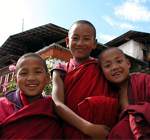In order to enable their children to move with their changing environment, many Penans have relocated closer to town for their children to receive education in government schools. The expectant women of the tribe also benefit from being closer to the hospitals in town where they can receive maternity care and medical treatment.
Some families are lucky enough to be allocated a place in the government-provided Rumah Sakai in Limbang but a number of families squat in makeshift temporary lodgings put together from tree stems and plastic sheets. Whether they are accommodated in wooden structures or concrete dwellings, their possessions are very basic and frugal, and hardly sufficient in a society that they are trying to adapt to.Recognising the Penan struggle, the
Helping Hands Penan was formed to highlight the tribe's difficulties in settling in the modern environment and to provide assistance in a localised manner. Their prime objective is to help the Penan children, who's families are settled in communities near town, to receive continuous education in a safe environment and to create new opportunities of livelihood for their families.
Many of these women still have valuable weaving skills which are in danger of vanishing if their offsprings do not wish to learn them. The older ladies are able to apply these skills to producing exquisite woven-ware such as baskets and floor mats. Tribal woven-ware are traditionally crafted from stripped bamboo and rattan but these are hard to come by in towns. To perpetuate the weaving-skills and help the women in transition support their families, the
Helping Hands Penan has added a modern twist to this cottage activity by introducing vibrantly-coloured, durable plastic as an alternative raw material, giving these women a new role as producers of fashionable handicrafts.
The
Helping Hands Penan team comprises volunteers from Kuala Belait and the Panaga area, including some teachers and students from the Jerudong International School in Bandar Seri Begawan, Brunei. They raise funds through several activities for the benefit of the Penans by:
- Selling Penan crafts -blowpipes, baskets, backpacks, floor and table mats, bangles and necklaces, all handmade from raw materials from the jungle.
- Selling non-Penan craft like framed ethnic earrings.
- Selling greeting cards with photos donated by professional photographers and friends of Helping Hands.
- Collecting donations in the form of food and second-hand items.
Besides the sales-and-collection drive, the group also helps to find sponsors to fund the students' basic needs and their cost of transportation for the journey to school from the Rumah Sakai as well as back to their jungle homes, which is a long way to the interior. Without safe transport, the students sometimes accept rides from strangers and loggers who may take advantage of their youth and vulnerability and abuse them. Their latest contribution to the community to date is 'Project Light' - supplying energy-efficient solar panel lighting as an alternative to their kerosene lamps.If you would like to lend a hand or own a piece of authentic Penan craft, write to
helpinghandspenan@gmail.com or find them on
facebook. 100% of the proceeds go to the Penans.









